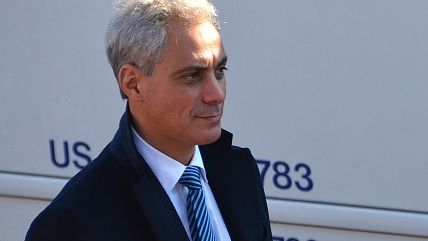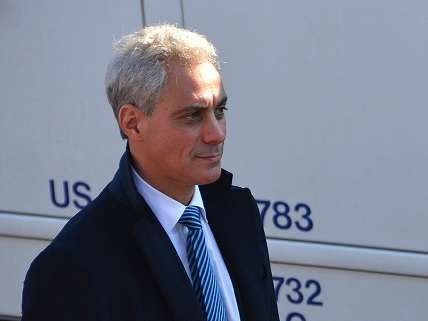Rahm Emanuel Announcing Plans for 'Major Overhaul' of Chicago PD This Afternoon
To include equipping all cops with Tasers


Since November, Chicago Mayor Rahm Emanuel has faced protests over police abuse sparked by the release of video of the 2014 police shooting of 17-year-old Laquan McDonald by Officer Jason Van Dyke. Van Dyke was indicted on multiple counts of murder and official misconduct after a judge ordered the release of the shooting video. The state's attorney said she had already made the decision but was waiting for a federal investigation to end.
This weekend, police in Chicago accidentally shot and killed a mother of five in the process of shooting and killing a bat-wielding 19-year-old, and on Tuesday Emanuel cut his family vacation in Cuba short to return to Chicago. Later this afternoon, he's expected to announce plans to arm every police officer in Chicago with a Taser and train cops in conflict resolution as part of a "major overhaul" of the department. Earlier this month, Emanuel demanded "sweeping police reform" in a speech to the city council, fired his police superintendent, Garry McCarthy, and created a reform panel (s.o.p) that included Deval Patrick, the former Massachusetts governor and a Chicago native, a former Illinois State Police director, and the president of the Chicago Police Board. Not very promising.
Some protesters have been calling for Emanuel's resignation, although the Chicago Democratic political establishment remains relatively firmly behind him—a measure to permit voters to recall Emanuel, for example, has gained little steam, and few politicians have joined in calls for his resignation, likely cognizant that they could be next. Failure has many fathers (and mothers). In November 2014, for example, the same month Van Dyke shot and killed McDonald, the city council unanimously approved a five-year contract for Chicago police. Raises, not privileges and accountability measures, were pretty much the only sticking point.
Rahm Emanuel's resignation could be an acknowledgement of the depths of the problem, but on its own it's not a solution nor even a step toward one. There are blueprints for reform, and they don't require a blue ribbon panel stocked with politicians and police. This summer activists from Black Lives Matter launched Campaign Zero—a list of reforms to police practices and policies that work toward eliminating excessive police violence and increasing accountability that have been adopted in some jurisdictions and could be adopted in others. And earlier this month, they launched Check the Police, a program to collect and analyze police contracts around the country in an effort to direct attention to how they perpetuate police violence.
Every member of the Chicago City Council voted to approve a police contract that keeps Van Dyke employed despite facing charges for murdering a 19-year-old. Residents of Chicago are stuck with that contract, as well as Emanuel and each of his, and police's, enablers in the city council for the next four years. Outrage alone isn't going to reform police or lower police abuse in Chicago or anywhere else—changes to the laws and contracts that offer the privileges that thwart police transparency and accountability will.
Watch the conference, at 3pm ET, here.


Show Comments (70)